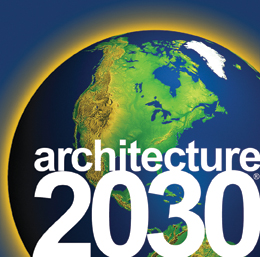
US Conference of Mayors (USCM) Resolution #50 for all Cities
June 2006
The US Conference of Mayors is the official nonpartisan organization of cities with populations of 30,000 or more. There are 1,139 such cities in the country today. Each city is represented in the Conference by its chief elected official, the mayor. In 2006, the USCM passed Resolution #50 calling for all new buildings and renovations (in all cities) to meet the 2030 Challenge targets.

National Association of Counties (NACo) (pdf)
September 2007
NACo supports the 2030 Challenge to ensure that all new and renovated public buildings are carbon neutral by 2030.
NACo supports federal efforts to promote high performance green building principles.

County of Sarasota, FL (pdf)
July 2006
Sarasota County was the first county in the nation to adopt The 2030 Challenge. The resolution that was adopted at the county commission’s July 11, 2006 meeting established a policy of carbon-neutrality in everything from procurement procedures to water treatment facilities, public transit and utilization of renewable energy technologies.

County of Santa Fe, NM (pdf)
Resolution No. 2006-149
September 2006
A Resolution to Endorse the U.S. Conference of Mayors’ Climate Protection Agreement Adopting Higher Performance Energy Efficient Building Standards (Commissioner Montoya) The motion to approve Resolution 2006-149 passed by unanimous [5-0] voice vote.

The Boulder County Consortium of Cities, CO (pdf)
January 2007
The Boulder County Consortium of Cities establishes a Task Force to … design the steps needed to implement the “Net Zero by 2030” goals (the “2030 Challenge”) that has been endorsed by AIA and several US cities. The Task Force will provide recommendations that address both residential and commercial construction.

County of Fulton, GA (pdf)
March 2007
Atlanta Mayor Shirley Franklin joined other mayors from around the country to adopt the 2030 Challenge. The Fulton County Commission voted in 2007 to adopt a resolution that supports the 2030 Challenge.

County of Marin, CA (pdf)
May 2010
The California Energy Commission has approved the County of Marin’s local ordinance, which requires new construction projects to meet and exceed the initial energy efficiency target of the 2030 Challenge.

City of Albuquerque, NM
As of September 2007
Mayor Chávez signed the adopted revised Energy Conservation Code, which requires commercial and multi-family residential buildings to be 30% more energy efficient than the previous code.
June 2006
Mayor Chávez issued Executive Instruction No. 20 which calls for adopting energy-efficient green building performance “2030 Challenge” targets for all new municipal projects.

City of Santa Fe, NM (pdf)
As of July 2009
All new applications for single-family residential buildings in the City of Santa Fe are subject to the Residential Green Building Code, which requires a minimum of a HERS Index of 70 and that the building perform 30% better than the RESNET “American Standard Building”.
June 2006
The City of Santa Fe was the first US city to accept The 2030 Challenge, as presented by the US Conference of Mayors, agreeing to achieve carbon-neutrality in all new public buildings by the year 2030.

City of Cambridge, MA
Order No. 19
June 2006
RESOLVED: That the Cambridge City Council go on record supporting the efforts of the U.S. Conference of Mayors in its “2030 Challenge” for building performance targets.

City of Santa Barbara, CA
As of October 2007
A glowing Santa Barbara City Council unanimously approved the Architecture 2030 Energy Ordinance today, legislation that, if approved by the California Energy Commission, will give Santa Barbara some of the most advanced environmental building standards in the state.
January 2007
Under the new policy, new construction and major renovations to City-owned and operated buildings will be designed to exceed California Title 24 Energy Efficiency Standards by 20%. With the adoption of this policy, the City accepted the nationwide “Architecture 2030 Challenge.”

City of Durango, CO (pdf)
March 2007
Under the initial list of implementation measures recommended to achieve the goals and objectives in Durango’s Comprehensive Plan is to develop a Sustainability Action Plan to: Meet the “2030 Challenge” adopted by the American Institute of Architects and endorsed by the National Council of Mayors.

City of Portland, OR (pdf)
As of October 2009
The City of Portland and Multnomah County Climate Action Plan 2009 includes the “2030 Objective” of achieving zero net greenhouse gas emissions in all new buildings and homes by 2030 and includes the call to, “participate actively in the process to revise the Oregon building code to codify the performance targets of Architecture 2030” as its first “Action to be completed before 2012.”
March 2007
The City Council passed Resolution No. 36488, which adopted the Peak Oil Task Force goal of reducing fossil fuel use 50 percent by the year 2030. It also aligned itself with the goals of Architecture 2030, an initiative adopted by the American Institute of Architects, the U.S. Conference of Mayors, including Portland’s Mayor Tom Potter, and hundreds of governments and businesses to quickly and dramatically improve building performance.

City of Lafayette, CO (pdf)
Resolution No. 2007-19
May 2007
The City recognizes that Green Points and other strategies and programs do not currently meet long-term goals. Therefore, the City supports the establishment of a Boulder County Consortium of Cities Task Force to … design the steps needed to implement the “Net Zero by 2030” goals (the“2030 Challenge”), as endorsed by the AIA and several U.S. cities, by providing recommendations that address both residential and commercial construction.
For more information, contact the City of Lafayette Community Development Department at phillipp@cityoflafayette.com.

City of Vancouver, Canada
July 2007
After a recent keynote by Architecture 2030 at the EcoDensity conference in Vancouver, the City Council voted unanimously to adopt aggressive citywide GHG emissions targets and The 2030 Challenge target of ‘carbon neutral’ for all new buildings by 2030.

City of Seattle, WA (pdf)
As of October 2007
The City of Seattle, City Green Building, conveys its commitment to helping Seattle’s building industry achieve 2030 Challenge goals in a way that creates environmental, economic and social value.
August 2007
Council Proposes Additional 2007 Comprehensive Plan Amendments: Adopt Architecture 2030’s “2030 Challenge” as the standard for city buildings, procurement and other public investments.

City of Richmond, VA
October 2007
To make the City of Richmond more environmentally friendly for both the community and the Earth, Richmond Mayor L. Douglas Wilder has expressed his commitment to make all City-owned buildings pollution-free within the next 23 years as outlined in the “2030 Challenge.”

City of Dallas, TX (pdf)
Ordinance #081070
April 2008
The Dallas City Council adopted a resolution and passed an ordinance for the implementation of a citywide green building program. The long term vision for the program is for Dallas to be carbon neutral by 2030.

City of Aspen, CO (pdf)
September 2008
The Aspen City Council gave approval for Staff to move forward on adopting the 2030 Challenge, and also asked that the Pitkin County Board of County Commissioners do the same.

City of San Antonio, TX (pdf)
March 2009
The City of San Antonio adopted a Sustainable Buildings Ordinance in March of 2009, which set a goal to achieve net-zero carbon for all new construction by 2030 and established interim incentives and minimum building energy codes to help achieve this target.

City of Portland, ME
April 2009
The Portland city council unanimously passed a green building ordinance requiring that municipally owned new construction and major renovations meet the energy reduction targets of the 2030 Challenge.

City of Union City, CA (pdf)
February 2010
The California Energy Commission has approved the City of Union City’s local ordinance, which requires new construction projects to meet energy efficiency targets consistent with the 2030 Challenge.

City of Los Altos, CA (pdf)
February 2010
The California Energy Commission has approved the City of Los Altos’ local ordinance, which requires major renovation and new construction projects to meet energy efficiency targets consistent with initial target of the 2030 Challenge.

Fort Collins, CO (pdf)
October 2013
Fort Collins Utilities’ Integrated Design Assistance Program (IDAP) provides technical assistance and financial incentives to help architects, engineering professionals, and building owners optimize energy and demand savings and reduce operating costs in new construction and major renovation projects meeting the energy reduction targets of the 2030 Challenge.
Other Legislation

City of Austin, TX (pdf)
February 2007
The Austin Climate Protection Plan will make Austin the leading city in the nation in the fight against global warming. The broad elements of the plan to reduce greenhouse gas (GHG) emissions includes making Austin’s building codes for both residential and commercial properties the most energy efficient in the nation.





